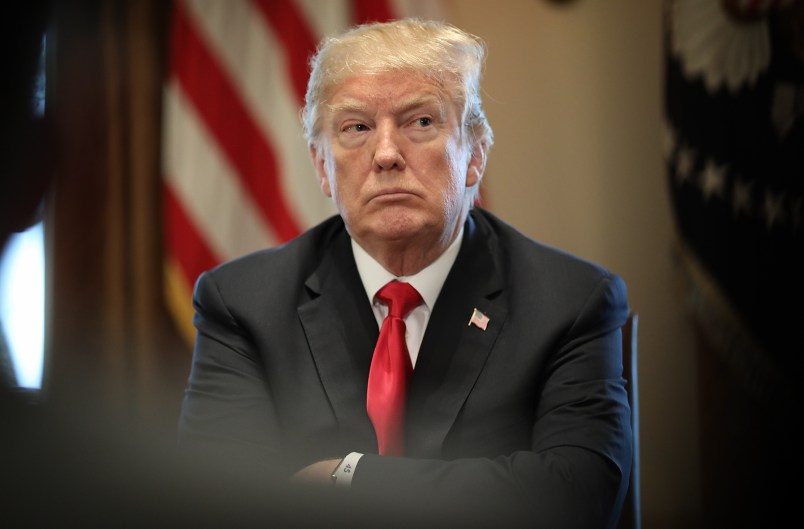WASHINGTON (AP) — Determined to protect vital American industries, President Donald Trump said Thursday that he will impose tariffs on steel and aluminum imports in response to what he called decades of unfair trade policies.
Trump summoned steel and aluminum executives to the White House and told them that next week he would levy penalties of 25 percent on steel and 10 percent on aluminum imports. Those tariffs, he said, will remain for “a long period of time.”
“What’s been allowed to go on for decades is disgraceful. It’s disgraceful,” Trump said during a meeting in the Cabinet Room. “You will have protection for the first time in a long while and you’re going to regrow your industries,” he said.
Plans for Trump to make an announcement were thrown into doubt earlier amid internal wrangling over the decision. Some White House officials, including chief of staff John Kelly, were not fully briefed on the Commerce Department’s plans, according to a senior administration official familiar with the process. This official was not authorized to publicly discuss the internal deliberations and spoke on condition of anonymity.
The possibility of an announcement, on an issue overseen by Commerce Secretary Wilbur Ross and White House trade adviser Peter Navarro, caught some top White House officials off guard and left several aides scrambling for details.
Key Senate offices also did not receive advanced warning that Trump was expected to announce a decision before April deadlines.
Increased foreign production, especially by China, has driven down prices and hurt American producers, creating a situation the Commerce Department says poses a national security threat.
Any action to impose tariffs is likely to escalate simmering tensions with China and other U.S. trading partners. Critics of such a move fear that other countries will retaliate or use national security as a pretext to impose trade penalties of their own. They also argue that sanctions on imports will drive up prices and hurt U.S. automakers and other companies that use steel or aluminum.
Trump met with more than a dozen executives, including representatives from U.S. Steel Corp., Arcelor Mittal, Nucor, JW Aluminum and Century Aluminum.
Trump tweeted earlier Thursday that many U.S industries, including steel and aluminum “have been decimated by decades of unfair trade and bad policy with countries from around the world. We must not let our country, companies and workers be taken advantage of any longer. We want free, fair and SMART TRADE!”
The president had until April 11 to make a decision on steel, and until April 19 to decide about aluminum.
The Commerce Department had recommended tariffs on all steel and aluminum imports, higher tariffs on imports from specific countries or a quota on imports.
Ross last month offered the president three options:
—tariffs of 24 percent on all steel and 7.7 percent on aluminum imports from all countries.
—tariffs of 53 percent on steel imports from 12 countries, including Brazil, China and Russia, and tariffs of 23.6 percent on aluminum imports from China, Hong Kong, Russia, Venezuela and Vietnam. Under this option, the United States would also impose a quota limiting all other countries to the aluminum and steel they exported to the United States last year.
—a quota on steel and aluminum imports from everywhere, limiting each country to 63 percent of the steel and 86.7 percent of the aluminum they shipped to the U.S. last year.
Trump last year ordered an investigation into whether aluminum and steel imports posed a threat to national defense. Ross said last month that the imports “threaten to impair our national security,” noting, for example, that only one U.S. company now produces a high-quality aluminum alloy needed for military aircraft.
Section 232 of the Trade Expansion Act of 1962 gives the president authority to restrict imports and impose unlimited tariffs if a Commerce Department investigation finds a national security threat.







Has Trump Enterprises ever used American steel and aluminum for their resort projects?
Stupid. The regime is making the assumption that other countries won’t retaliate.
The world watches spellbound.
“Of Trump’s last three construction projects, the first to use Chinese steel was Trump International Hotel Las Vegas, which opened in 2008. That the manufacturer is from China is not immediately evident; this fact is hidden within a chain of various corporate entities, including holding companies registered in the British Virgin Islands.”
Burly Bob can get you some great Panama steel rolls. Knock twice and bark like a Chihuahua. Tell them Hector sent you.